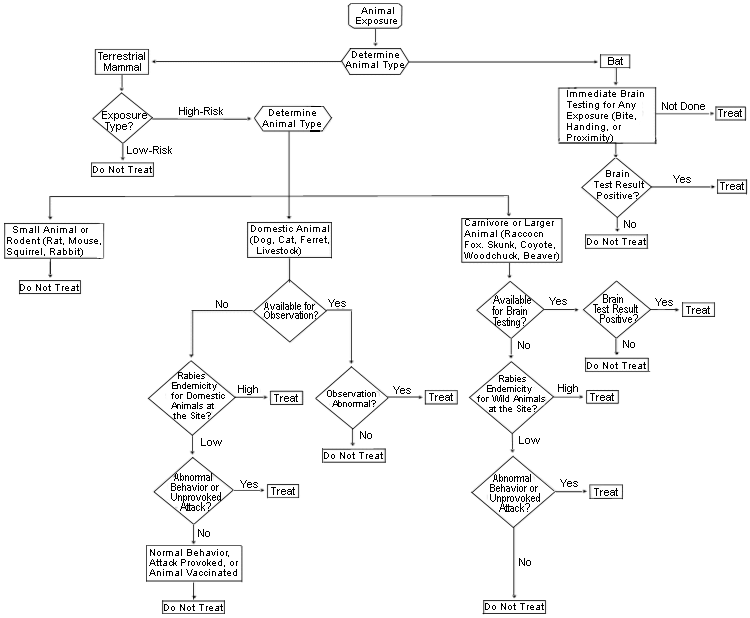Nejm 2004;351:2626; Ann IM 1998;128:922
Cause: Rabies virus, a rhabdovirus
Pathophys: Spreads along nerves to CNS
From saliva of infected animal, inhaling infected guano in bat caves, or corneal transplants (Nejm 1979;300:603). Bats may be reservoir since not killed by it. Cats are now most commonly affected domestic animal. Most common wild animals affected: bats, foxes, skunks, raccoons; and prey species like rabbits, woodchucks, and goats (Me Epigram 12/95)
Cyclic prevalence q 100 yr, peaked in 1965. 20 cases in US 1960-1980 (Ann IM 1984;100:728); incr again in US so that 22 cases 1990-1996. Over 20 cases in animals annually in Maine alone (Me Epigram 12/95)
Sx:
H/o animal bite except in bat rabies where often no h/o bite (Mmwr 1995;44:625)
Pain/paresthesias at exposure site in 50%; difficulty swallowing in 65%; fever; priapism; nausea and vomiting; Guillain-Barré-like syndrome
Si: Encephalitis with tonic contractions of muscles, esp throat on minimal stimulation (hence hydrophobia)
15- to 60-d incubation (depends on nerve length), rarely up to 6 yr later (Nejm 1991;324:205)
Fatal unless rx'd before sx, usually, although some severe cases now recovering with supportive care, ie, respirator, etc (Ann IM 1976;85:44). 2/38 survived 1960-1980
May be misdiagnosed as Guillain-Barré
Lab:
CSF: Elevated protein after 1 wk; cells are a mix of lymphs and polys, 6-300/mm3
Path:Negri bodies in brain at postmortem
Serol: Half positive after 1 week of sx, 2/3 after 1.5 wk, all positive by 2 wk of sx
Rx:
(see flow sheet—Jama 2000;284:1003)
Vaccinate (Med Let 1998;40:64) w human diploid cell vaccine (HDCV) (Imovax); rabies vaccine absorbed, or purified chick embryo cell (PCEC) (RabAvert); all ~$700/5 shot series; chloroquine malaria prophylaxis may prevent adequate immunization (Nejm 1986;314:280)
- Primary series postexposure = HDCV im on day 1, 3, 7, 14, 28
- Preexposure = day 1, 7, and 28 im, or 1/10 im dose intradermal day 1, 7, 21, or 28
- Booster
- Post repeat exposure after previous primary series w shots day 0 and 3
- q 2 yr to veterinarians and other high-risk people
For acute single exposure: vaccinate as above + HRIG (immune globulin) 20 IU/kg, 1/2 in wound, 1/2 im in deltoid in adult, thigh in child, not gluteal area (Nejm 1987;316:1256, 1270); use liberally even if no bite in bat exposures (Mmwr 1995;44:625)
of disease: supportive care, like respirator, amantadine, sedation can result in survival, though w permanent deficits (Nejm 2005;352:2508, 2549)
FIG 9.2 Animal Exposure 

Reproduced with permission from Moran GJ, et al. Appropriateness of Rabies Postexposure Prophylaxis Treatment for Animal Exposures. J Am Med Assoc. 2000;284::1001. Copyright 2000, American Medical Association, all rights reserved.

